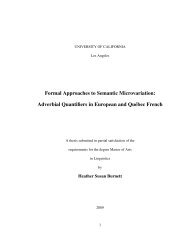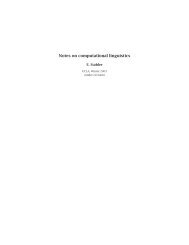Post Verbal Subjects and Agreement in Brazilian Portuguese
Post Verbal Subjects and Agreement in Brazilian Portuguese
Post Verbal Subjects and Agreement in Brazilian Portuguese
You also want an ePaper? Increase the reach of your titles
YUMPU automatically turns print PDFs into web optimized ePapers that Google loves.
5. COMMENTS ON SOME ALTERNATIVE ANALYSES:<br />
This section briefly considers alternatives to the analysis proposed <strong>in</strong> this paper.<br />
Section 5.1 suggests aga<strong>in</strong>st two possible alternative analyses <strong>and</strong> section 5.2<br />
comments on the possibility of address<strong>in</strong>g BP agreement under Chomsky’s (2000,<br />
2001) Agree.<br />
5.1. Some conceivable, but unlikely Alternatives<br />
This section briefly suggests aga<strong>in</strong>st two different possibilities that could<br />
conceivably be proposed as basis of an analysis of BP agreement: always<br />
correlat<strong>in</strong>g verb agreement with movement of the subject past spec-TP (section<br />
5.1.1.) <strong>and</strong> attribut<strong>in</strong>g variant agreement to diglossia (5.1.2).<br />
5.1.1. Correlat<strong>in</strong>g verb agreement with high subjects<br />
A possible alternative analysis for the alternations discussed here would be to say<br />
that the two possibilities seen <strong>in</strong> variant agreement are due to movement versus no-<br />
movement of the post verbal subject. For example, VS unaccusatives with post-<br />
verbal subject agreement could be derived by propos<strong>in</strong>g that the subject moves up<br />
to a position where it enters <strong>in</strong>to a spec-head configuration with the verb<br />
(account<strong>in</strong>g for agreement). This would then be followed by verb movement<br />
(account<strong>in</strong>g for VS):<br />
36

















